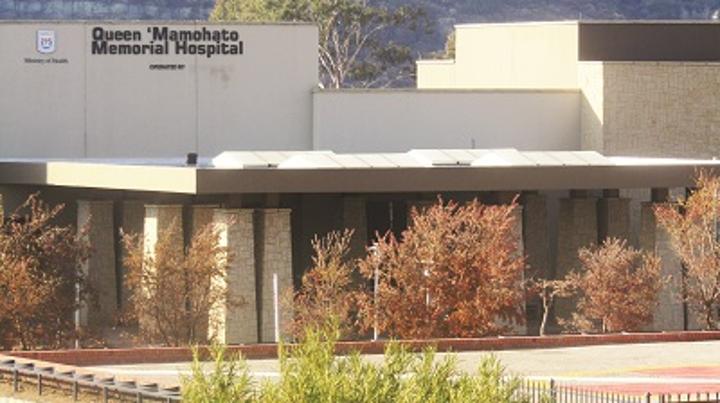Africa-Press – Lesotho. Following the earlier reports that Tšepong Consortium, a company that runs the country’s referral hospital, Queen ‘Mamohato Memorial Hospital (QMMH) had vacated the premises, the said departure
did not see the light of the day. This is owing to some ongoing talks between the Ministry of Health (MoH) and the group. The Minister of Health Hon. Semano Sekatle said they are now in transition period where they are working
on modalities for the handover and the takeover. The Minister said the group is set to make the exit at the hospital later on August 31. It is expected that
the government will take over after this date. The government had in 2011 entered into 18 years Public Private Partnership (PPP) agreement with the Tšepong Consortium to run the QMMH.
Tšepong Pty (Ltd) is a consortium of five companies that runs Lesotho’s referral Queen ‘Mamohato Memorial Hospital (QMMH) and its shareholding comprise Netcare, which
holds a 40% stake within the consortium while the remaining 60% shareholding is held by Afrinnai Health (Pty) Ltd 20% – South African based company, and the
local companies comprising of; Excel Health Services (Pty) Ltd with 20% shareholding, D10 Investments (Pty) Ltd (D10) which has 10% shareholding, and Women Investment Company (Pty) Ltd (WIC) with 10% stake.
Last week Thursday, the QMMH Public Relations Officer (PRO), Thakane Mapeshoane told Informative Newspaper that the government is taking over the operations of the
hospital effective from Thursday last week. She said the Tšepong management has taken off their names, policies and the standard operation procedure (SOP) – a guiding tool detailing the working procedure.
Mapeshoane also highlighted that the July and August salaries will be paid by Tšepong Pty (Ltd). Despite enjoying a long strained relationship from the “inception” of the Public Private
Partnership (PPP) agreement between Tšepong Consortium and the government, the final straw that broke the camel’s back was when the group fired its 265 nurses
and nursing assistants following the prolonged strike earlier this year over the salaries increment. The nurses had embarked over a 40 days industrial action where they had petitioned it to have
their salaries reviewed, during which time they had downed tools. The group had previously reviewed its staff salaries in 2012; the action which prompted the
nurses to engage in industrial action. The government had since absorbed all the fired nurses effective from May 1. The other complaint that the former Tšepong nurses said they felt hard done by was that they felt
aggrieved by the arrangement that they will have to mentor the Ministry of Health (MoH) nurses who are deployed at QMMH to treat the COVID-19 patients.
They had argued that the move was unfair on their part, as they were to do skills transfer to the people whose salaries surpass theirs. The Lesotho Nurses
Association (LNA) has said that their members deem this move as “unfair”. “The situation was aggravated from the 18th January 2021 when Tšepong Management
informed Nurses and Nursing Assistants that Tšepong will be another center where Covid-19 confirmed cases will be managed. Additionally, [the] Ministry of Health will deploy nurses and nursing
assistants to assist in managing the cases and Tšepong staff will be allocated to capacitate them (skills sharing),” reads the LNA’s letter. The letter had
furthered that it is unfair to receive salary far less than what their colleagues are getting yet they are working in a tertiary hospital where all complicated services across the country are referred to”.
On March 24, the Netcare Hospital Group (Pty) Ltd, a majority shareholder of Tšepong Consortium, issued a heavily worded statement following the government’s announcement to PPP contract.
It had accused the government of among others, the delay of payments which the group said affect the salaries of their staff and their operations. “Tšepong is a thinly capitalised entity
without access to working capital, and therefore unable to meet financial obligations when monthly payments by GoL [Government of Lesotho] are delayed.
During these prolonged periods of non-payment – sometimes up to five consecutive months – Netcare provided the interest-free bridge funding to sustain the financial position of Tšepong.
“While Tšepong has been trading solvently, Tšepong’s ability to declare dividends and maintain liquidity has been severely
constrained by the poor payment history by GoL and poor support, by some members of the Tšepong board, to act in the interest of the company and take action to collect fees owing by GoL,” says Dr Chris Smith, the Finance General
Manager at Netcare. Despite the PPP contract touted as the best move elsewhere, the Oxfam report poked the holes into the arrangement saying it was not financially viable for the government on
a sustainable basis. The report reads: “The Queen ‘Mamohato Memorial Hospital was built to replace Lesotho’s old main public hospital under a Public Private Partnership (PPP) – the first of its
kind in a low-income country. The PPP signed in 2009 was described as opening a new era for private sector involvement in healthcare in Africa, and was seen as
the International Finance Corporation (IFC)’s flagship model to be replicated across the continent. Instead, the Ministry of Health in one of the poorest and
most unequal country in the world is locked into an 18-year contract that is already using more than half of its health budget (51 per cent), while providing high returns (25 per cent) to the private partner.
“This is a dangerous diversion of scarce public funds from primary healthcare services in rural
areas, where three-quarters of the population live. Lesotho’s experience supports international evidence that health PPPs of this kind are high risk and costly, and fail to advance the goal of universal and equitable health coverage.”






